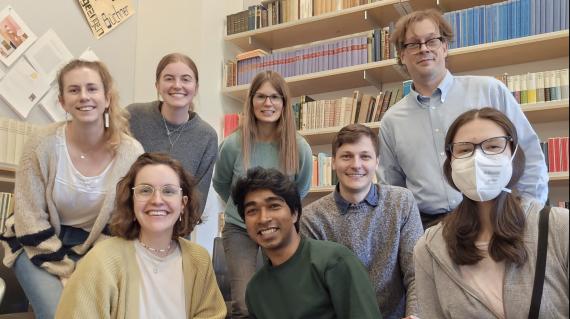Professor Frederike Middelhoff is this year’s distinguished Max Kade Visiting Professor from the Goethe-Universität Frankfurt am Main. In Frankfurt am Main, Dr. Frederike Middelhoff works as a professor of romantic-era German literature, leads a wide variety of interdisciplinary research groups, and holds several editorial and advisory positions. She is currently working on a Handbook for Literature and Ecology (Handbuch Literatur & Ökologie) and is teaching a graduate-level course here at UW. She was kind enough to sit down with me for a short interview in her office.
How has your experience in Seattle been? Is this your first time to Seattle?
Great so far. I’m really grateful to be here and to get to know the city and the department in general. I have been to several talks, including one with the “father of environmental justice”, Robert D. Bullard – which was very inspiring. Seattle and the surrounding area are gorgeous. And I love the discussion with the students.
I went to Seattle 13 years ago. I visited for a day when I was in Portland with my partner at the time who had an internship there. I always wanted to come back at some point, so I find myself very lucky to have the opportunity to stay for 10 weeks!
How does Seattle compare with Frankfurt am Main, where you live and work?
In academic terms, they’re similar. There’s no “Seattle School” like the “Frankfurt School”, I guess, but at UW, there’s a big interdisciplinary working atmosphere. The academic environment is very vibrant and inclusive: you can attend several great talks in one evening. It’s the same in Frankfurt.
There is more to explore in terms of surroundings in Seattle, there aren’t any old-growth forests around Frankfurt (unfortunately!). You also can’t swim in the Main River because it’s too polluted.
Frankfurt is bank-heavy while in Seattle you have the tech firms. Both of which, as I understand it, cause prices to rise all the time.
You are currently working on a book on the romantic period as the “Age of Emigrations”, what brought you to this topic?
This goes back to shifting paradigms in theory and relevance. There are reasons why migration is relevant again. After my Ph.D. I was looking at migration in contemporary literature, but then I applied for a position that focused on the 18th century, so I asked whether anyone thought about German Romanticism and migration. This presents a new angle to looking at Romanticism.
How can studying depictions of French emigrants in German literature in the 1800s help us understand today?
There is a dominant perception that the Romantics had a conservative perspective on politics, but they often commented on current migration politics in their literary texts.
The discourse on émigrés at that time still resonates today. Certain kinds of rhetoric and forms of discrimination that were common parlance at that time, about the French, are still relevant. Another aspect is that 20th and 21st-century exiled writers often refer to Heine and others, whose lives and works people can identify with and craft their own exile narratives through. However, we have to see the difference in the discussion around 1800, exile literature of the Nazi period. The scale of deportation and devastation caused in the Nazi period is not the scale of the 1800s. And the reasons for migrating were very different.
You are part of a group with Prof. Barbara Thums and Prof. Roland Borgards, who also came to UW as Max Kade Professors. How did you meet up and how have animal and ecocriticism studies influenced your work?
Quite a lot, we all work in Romanticism. I’ve been working with Prof. Roland Borgards since we met in Würzburg. We are both interested in animal studies and its relationship to literature and ecocriticism. Prof. Barbara Thums and I share a big interest in plants. We worked together on a teaching project on how to integrate plant studies in the classroom for a year. We came up with the idea of how to mix and merge these different fields with Romanticism.
I’m interested in what the Romantics knew about plant and animal migration in the 1800s. Poems about swallows and storks linked to human protagonists who migrate for economic or military purposes come to mind.
You have an impressive number of articles and books published. How do you stay organized and motivated to write?
What keeps me motivated is having different things to work on during the day (and getting up quite early for that). Since coming to Seattle, for example, I work on my book in the morning and edit other papers in the afternoon. I also like to set myself some goals and check if they are doable. I like to have a challenge sometimes. I also enjoy finding new texts and connections. I love working in the archive, finding materials that no one or few people have looked at. The interactions with students keep me going too.
You are teaching at UW this quarter. “Exile, Asylum, Refuge: German Literature in the Age of Emigrations,” how is that going?
I think it's going well. Both the students and I explore new texts, most of which are not canonical. So, this is an opportunity to experiment with different approaches to and aspects of emigration. Most of the time, I think, people enjoy the writers, but not every text will speak to a student.
